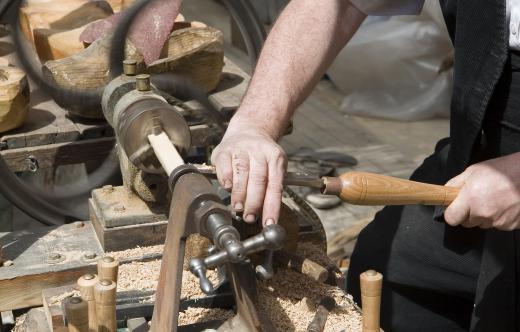A lathe milling attachment is a way to combine the shaping abilities of a lathe with the drilling and finishing power of a milling machine. The lathe milling attachment by itself is generally much smaller than a milling machine and is used primarily by hobbyists. Milling attachments are made to work with wood or metal but are typically made to work with metal more than wood. While some milling machines are automatic and controlled by computer, lathe milling attachments are generally manual. Milling attachment units come with many different drill bits to make different cuts in the material.
Full-size milling machines are commonly seen in the tool- and machine-making industry. While the attachment is similar to a drill press, the difference between a milling machine and a drill press is how the table holding the material moves. A drill press just holds the material, while a milling machine holds the material and can move the table to cut the sides of the material. A lathe milling attachment is the same as a milling machine in all regards, except for its size. The attachment is generally much smaller than a milling machine, but it still has the same cutting ability to finish a shape and add extra detail that a lathe cannot add.

To connect the lathe milling attachment, the milling portion is either placed on the end of the lathe or over the lathe itself. This allows the attachment to work immediately on the shape made from the lathe, without the operator having to move the material at all. The size of a milling attachment means these are usually reserved for hobbyists rather than for full-scale industrial use. Milling units are generally manual, or hand operated, and not controlled by a machine, but some are automatic.
Materials that lathe milling attachment units typically work with are wood and metal. Of the two, the milling attachment is more commonly made to work on metal. This is because metal typically needs the holes and finishing that milling attachments make to complete the part, whereas wood generally does not need the same finishing.
Depending on the operator’s needs, the lathe milling attachment can be fitted with different drill or cutting bits. Each bit has a different size and thread to make a different cut into the material. By having a variety of bits, the milling attachment becomes more versatile and can be used to make a wider array of parts for the operator.
